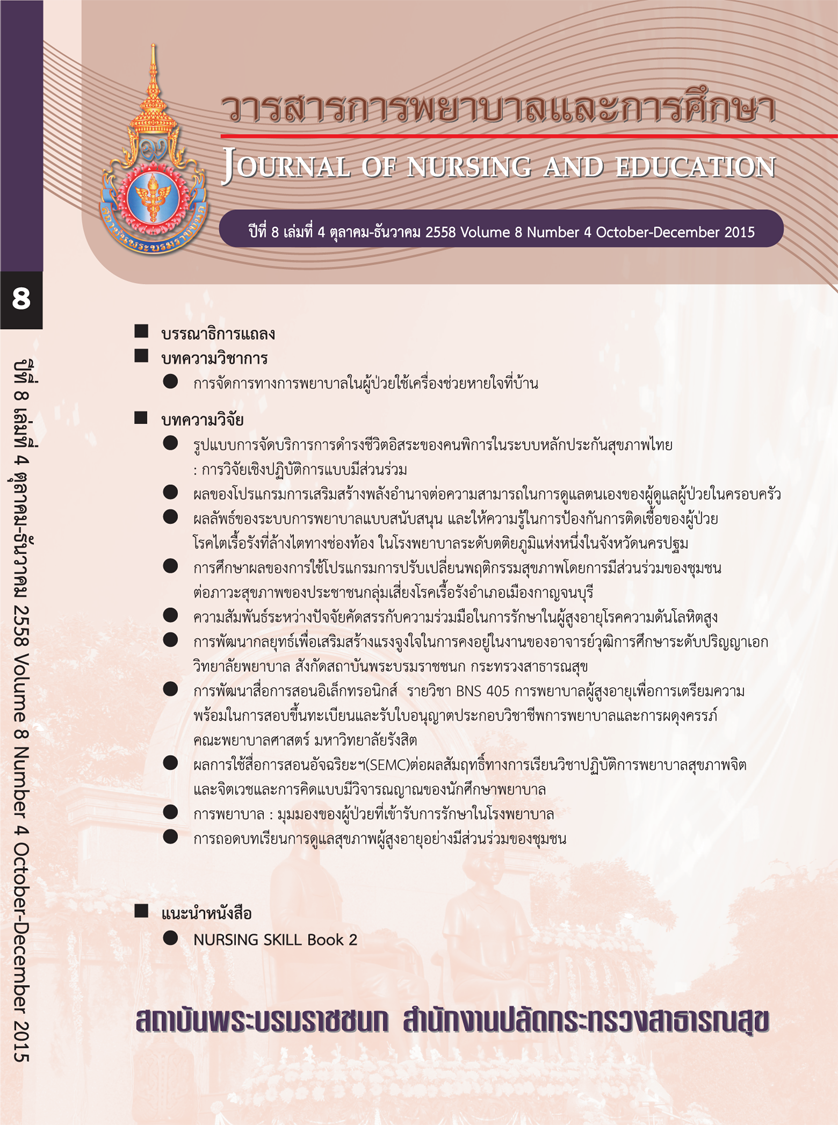การศึกษาผลของการใช้โปรแกรมการปรับเปลี่ยนพฤติกรรมสุขภาพ โดยการมีส่วนร่วมของชุมชนต่อภาวะสุขภาพ ของประชาชนกลุ่มเสี่ยงโรคเรื้อรังอำเภอเมืองกาญจนบุรี
คำสำคัญ:
พฤติกรรมสุขภาพ, โรคเรื้อรัง, กลุ่มเสี่ยง, Health Behavior, Non Communicated Disease, NCD, Risk Groupบทคัดย่อ
บทคัดย่อ
การวิจัยเชิงปฏิบัติการนี้มีวัตถุประสงค์ เพื่อศึกษา 1) ภาวะสุขภาพ ของกลุ่มเสี่ยงโรคเรื้อรังชุมชนเขตเมืองกับชุมชนเขตชนบท 2) ผลของโปรแกรมการปรับเปลี่ยนพฤติกรรมกลุ่มเสี่ยงโรคเรื้อรังเฉพาะในเขตชนบท ประชากรที่ศึกษา คือ กลุ่มเสี่ยงโรคเรื้อรังชุมชนเขตเมืองกับชุมชนเขตชนบทอำเภอเมืองกาญจนบุรี จำนวน 516 คน เครื่องมือมีทั้งหมด 2 เครื่องมือ ได้แก่ 1) แบบสัมภาษณ์ 2) แนวทางการสนทนากลุ่ม ระยะเวลาที่ศึกษาตั้งแต่เดือนตุลาคม 2557- เมษายน 2558 วิเคราะห์ข้อมูลด้วยโปรแกรมสำเร็จรูป โดยใช้สถิติเชิงบรรยาย ได้แก่ ร้อยละ ค่าเฉลี่ย ส่วนเบนเบี่ยงมาตรฐาน และสถิติทดสอบค่าที
(t-test)
ผลการศึกษาพบว่า
1) ภาวะสุขภาพและพฤติกรรมสุขภาพของกลุ่มเสี่ยงโรคเรื้อรังชุมชนเขตเมือง มีโอกาสเสี่ยงต่อการเกิดโรคเบาหวานชนิดที่ 2 โดยมีความเสี่ยงในระดับสูงมาก 63.1% มีความรู้ในระดับปานกลาง 36.1% มีพฤติกรรมการบริโภคอาหารของกลุ่มเสี่ยงอยู่ในระดับปานกลาง 48.4 % โดยระดับดีมาก มีเพียง 4 % มีภาวะน้ำหนักเกินและโรคอ้วนถึง 72.2 % มีความเครียดในระดับสูงถึง 44.3 % และในระดับรุนแรง 7.3% ส่วนกลุ่มเสี่ยงชุมชนเขตชนบท มีโอกาสเสี่ยงต่อการเกิดโรคเบาหวานชนิดที่2โดยมีระดับความเสี่ยงในระดับสูงมาก 51 % มีความรู้ในระดับปานกลาง 44.2 % มีพฤติกรรมการบริโภคอาหารของกลุ่มเสี่ยงอยู่ในระดับปานกลาง 54.1% และในระดับดีมาก 45.9 % มีภาวะน้ำหนักเกินและโรคอ้วน 59.4 % ความเครียดระดับสูง 47.7 % และระดับรุนแรง 5.8% เมื่อเปรียบเทียบความเครียดของเพศหญิงและเพศชายพบว่า ในกลุ่มตัวอย่างทั้งสองกลุ่ม เพศหญิงมีความเครียดสูงกว่าเพศชาย อย่างมีนัยสำคัญทางสถิติ (p < .001)
2) ผลของโปรแกรมการปรับเปลี่ยนพฤติกรรมกลุ่มเสี่ยงโรคเรื้อรังในชุมชนเขตชนบท จำนวน 394 คน พบว่าหลังการเข้าร่วมกิจกรรมมีค่าเฉลี่ยความรู้เพิ่มขึ้น มีค่าเฉลี่ยพฤติกรรมการบริโภคอาหารเพิ่มขึ้น ส่วนความเครียดลดลง อย่างมีนัยสำคัญทางสถิติ (p < .001) (ความรู้หลังเข้าร่วมกิจกรรม= 12.86, SD = 1.426 ก่อน= 11.37, SD = 2.346 พฤติกรรมการบริโภคอาหารหลังเข้าร่วมกิจกรรม = 51.18, SD = 7.725 ก่อน= 45.96, SD = 6.804 ระดับความเครียดหลังเข้าร่วมกิจกรรม= 35.08, SD = 11.541 ก่อน= 41.68, SD = 12.937)
คำสำคัญ : พฤติกรรมสุขภาพ โรคเรื้อรัง กลุ่มเสี่ยง
Abstract
This participation action research aimed to :1) study health status of NCD risk among Urban and Rural area , 2) study the result of health behavioral change program(HBC) in NCDs risk groups at rural area of Mueang Kanchanaburi District. The methodology,
the course action study during October 2014 to April 2015 with purposive sampling. There were 516 volunteers from Urban and Rural area attend HBC program, the data were collected by questionnaire and focus groups. Data were analysis by the descriptive, percentage, mean, standard deviation, Pair T-Test
Result showed as followed. 1) health behavioral of NCDs urban risk groups, relative risk of diabetes mellitus type2 was at high at level 63.1%, knowledge moderate level 36.1%, dietary consumption was moderate level 48.4% and dietary consumption good level 4%,over weight and obesity 72.2%, stress high level 44.3% and stress severe level 7.3%, health behavioral of NCDs risk groups rural, relative risk of diabetes mellitus type 2 high level 51%, knowledge moderate level 44.2%, dietary consumption moderate level 54.1% and dietary consumption good level 45.9%,over weight and obesity 59.4%, stress high level 47.7% and stress severe level 5.8%, however stress level of two groups sampling female was higher than male. They were statistically significant at p < .001
2) The result found that the mean score of knowledge, dietary consumption in 394 samples NCDs risk groups rural after HBC program intervention were statistically significant higher that the mean score before intervention at p < .001 and the mean score of stress level after intervention was also statistically significant lower that the mean score before intervention at p < .001 (knowledge after:=12.86, SD = 1.426 and before: = 11.37, SD = 2.346, dietary consumption after:= 51.18, SD = 7.725 and before: = 45.96, SD = 6.804, stress level after:= 35.08, SD = 11.541 and before:= 41.68, SD =12.937)
Keywords : Health Behavior, Non Communicated Disease: NCD,
Risk Group






